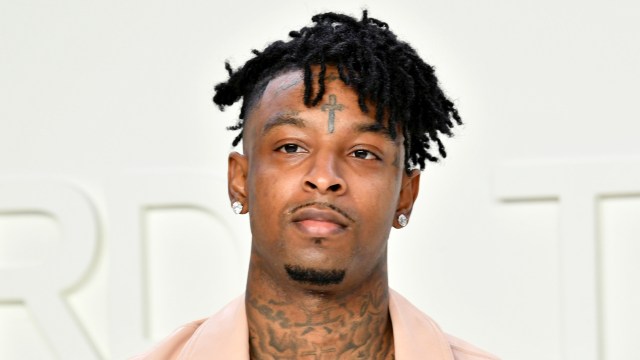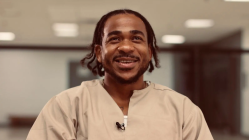21 Savage has taken to social media to defend the violent stories he often paints in his lyrics, reminding people it’s art and not real life.
On Monday (August 8), the Atlanta-based rapper tweeted a message about gun violence that read: “Atlanta We Have To Do Better Put The F****** Guns Down!”
Someone replied with a GIF of a man looking confused and some of 21 Savage’s lyrics from his Billboard chart-topping Drake collaboration “Jimmy Cooks” in the caption.
“Spin the block twice like there ain’t nowhere to park,” they wrote, to which 21 Savage replied: “A Song Is For Entertainment It’s Not An Instruction Manual On How To Live Life In Real Life I Give Away A Lot Of Money And Spread Financial Literacy To My Community Stop Trying To Make Me 1-Dimensional.”
Rap lyrics used as evidence in criminal cases has been a hot topic as of late. In June, 300 Entertainment’s Kevin Liles and Atlantic’s COO Julie Greenwald launched a petition dubbed “Rap Music on Trial: Protect Black Art,” which focuses on how prosecutors have continuously attempted to use rap lyrics in a courtroom.
The petition detailed how Young Thug, Gunna and their Young Stoner Life (YSL) collective have fallen victim to this prosecutorial tactic during their ongoing RICO case.
As Liles and Greenwald explained in a joint statement: “Weaponizing creative expression against artists is obviously wrong. But what gets us so upset is what’s happening to Young Thug, Gunna, and YSL is just the most high-profile case.”
Last month, the Restoring Artistic Protection Act (RAP Act) was introduced in the U.S. House of Representatives by Congressmen Hank Johnson (D-GA) and Jamaal Bowman (D-NY) amid growing concerns over lyrics being used against artists in criminal cases.
The first-of-its-kind bill seeks to “limit the admissibility of evidence of a defendant’s creative or artistic expression against such defendant in a criminal proceeding and for other purposes” and is aimed at amending Federal Rules of Evidence laws.











Yeah music is a form of expression, but somehow 21 has never expressed his disgust for gun violence in his music. If he isn’t one-dimensional, then he should be able to get through a song without a line about shooting someone. Two of the songs on SM2 are titled after a gun manufacturer. Like he is OD when it comes to rapping about shooting people. Idk if any other rapper talks about shooting people more than 21. He could Def dial it down a bit lol.
i listened to rap all my life and i never did any of the shit the lyrics were saying.. don’t blame the artists for his creative vision, blame the shitty parenting for not teaching their kid any better. I rather have a artist talk about this shit on wax, rather than actually go out and live it.. but it can be a double edge sword iono m8 shits fucked
Your comment about how I don’t because of this… doesn’t mean that there still isn’t a problem.
The hypocrisy in the hip hop community is pure comedy
It used to be for entertainment when youngins knew better. Now they on pills, drank and they all got guns. So you can’t be saying its just entertainment no more. These little cats don’t know any better.
creativity shouldn’t be suppressed if you don’t like it don’t listen plenty of others will don’t take that away from them.
Can’t demand people to put down their guns while he raps about guns and murdering of other black people
Two dimensional. He means two dimensional…. Lol
no, one dimensional is actually correct.
It’s not. Are you retarded? Do you even know how dimensions work? Fuck off to Snapchat, chump.
This is the reason violent lyrics are being used against artists in court. Lyrics in songs are now too violent regardless of it being art. Is it truly art by rapping I took out my AK-47 to shoot up his mom’s house? Or rapping about derogatory lyrics towards women when these things (increasing murder rates or domestic violence) happens in real life in high numbers?
He’s a layered actor. The way he really is a crumpet breath, Harry Potter ass Brit who’s cosplay got his brother killed. Fake ass bloods unite y’all!
drill rap it will be around i have one album from 21 savage it ain’t that bad it is 21 gang. but you know the pc brigade a real party pooper fuck them. everything these days don’t take this genre of rap away don’t like it don’t fucking listen.
Dude. Grammar. You’re dumb as fuck. I’m surprised you spelled “pc” right. Yuck. Definitely a drill fan.
I get what he’s saying, and I am > i was was an impovement, but he needs to be more diverse. Every tracks he is like:
Your girlfriend is giving me top (21). I will tend to slide om the opp (on god).
Rap music has always had negative elements, but society itself has lost its morality so nothing balances it out. Music is a reflection of a bigger problem that effects everyone.
To pretend like these are only “lyrics” is absurd. We need to stop lying to ourselves. But to each his own
“Put the guns down but I’ll continue to glorify guns and street culture in every verse” thanks
tea and crumpets time for sir savage the 21st
21 “savage”, go back to Britain and gang bang with your blokes.
I recently stopped listening to rap and have found that I am a much more peaceful person.
they like savage why you got a twelve car garage and you only got six cars